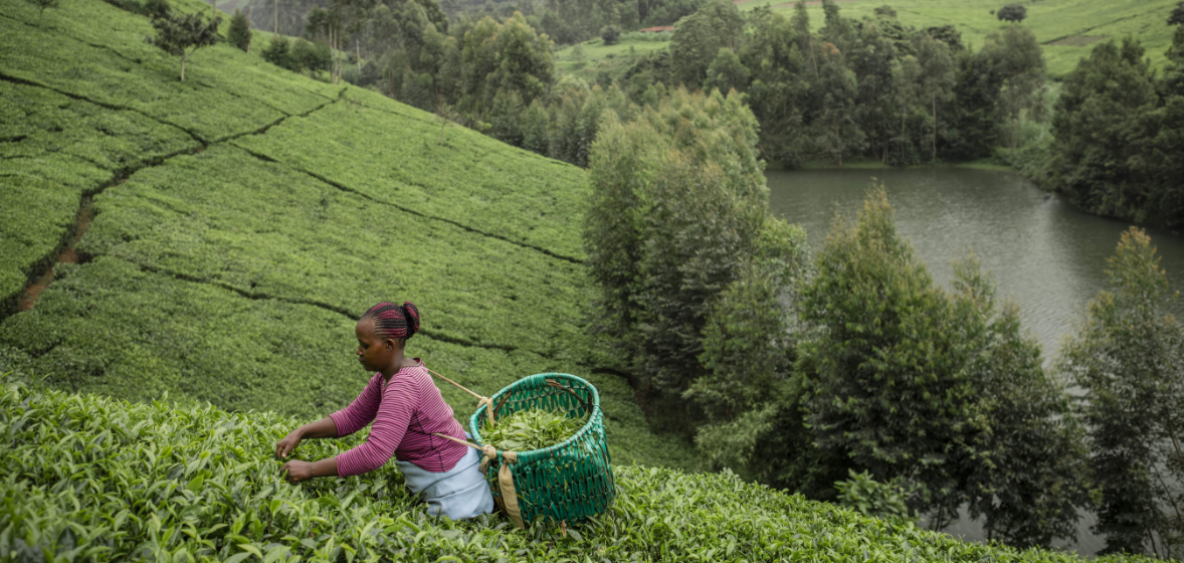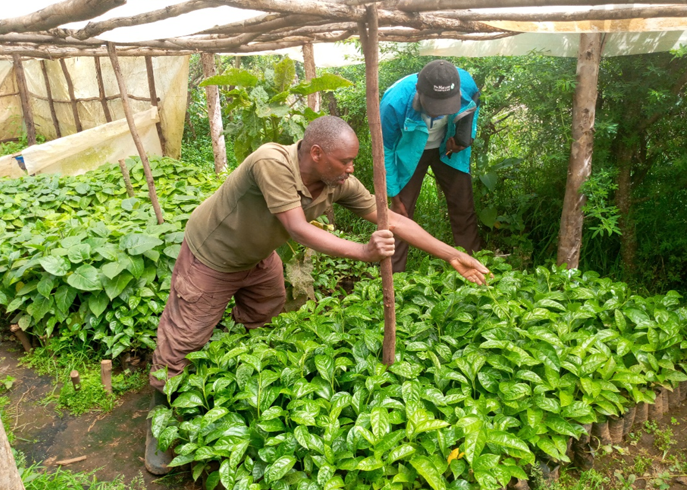 A farmer picking tea leaves on a tea plantation in the Upper Tana Watershed, Kenya. Photo credit: Nick Hall
A farmer picking tea leaves on a tea plantation in the Upper Tana Watershed, Kenya. Photo credit: Nick Hall By partnering with the public and private sectors, UTNWF is mobilizing extension services to help farmers maximise benefits to the environment and their livelihoods.
The agricultural sector in sub-Saharan Africa employs more than 50% of the total labour force and provides a source of livelihood for millions of smallholder farmers.
For years, agriculture in Kenya has been influenced by both climatic and anthropogenic factors. The impacts of inadequate rains on agricultural production have been particularly severe due to the predominance of rainfed cropping systems. Climate projections indicate that rainfall variability is likely to increase in the region and further impact food security for the rapidly increasing human population.
In the rural areas of Kenya, these challenges are compounded by inadequate or inexistent extension services to farmers. The lack of public extension services has been identified as one of the impeding factors to agricultural growth in the country. Smallholder farmers not only require services to improve crop productivity but also advice on other development areas like access to markets, value addition, and diversified income generation opportunities.
To counter this, the Upper Tana Nairobi Water Fund (UTNWF), which is led by the International Fund for Agricultural Development and the Nature Conservancy (TNC), rolled out a partnership program with county governments to support, train and link farmers to agricultural extension services through innovative communication channels.
In just 4 years, the project has partnered with the county governments of Laikipia, Nyeri, Murang’a and Nyandarua to support more than 50,000 smallholder farmers. Each county government has assigned a full-time county extension officer to the project. The project has further recruited 15 youths as technology promoters to support farmers in the implementation of sustainable technologies for rainwater harvesting and irrigation.
-roshni-lodhia.jpg)
By April 2022, more than 51,000 farmers were implementing
sustainable land management measures in the Upper Tana River watershed leading
to clean water supply for millions of water users downstream. The watershed
supplies more than 95% of drinking water to Nairobi residents, hospitals,
schools, and industries. Sustainable management of the water sources, by
working with all stakeholders, is not only crucial for the environment but also
the social and economic development of the country.
To increase the number of farmers reached through the extension services, the UTNWF developed a mobile phone SMS platform that provides two-way communication between individual farmers and extension officers. The platform conveys conservation messages, weather information, and where to access farm inputs for the farmers. The platform has more than 70,000 registered farmers who benefit from the extension services.
Farmers have learnt much from the extension officers and now share the same information and knowledge to others in the community. Irene Mumiria, a smallholder farmer in Murang’a county, used to get low crop yields from her farm due to declining soil fertility as a result of erosion and unpredictable rainfall patterns in the region. The UTWNF showed her how to harvest rainwater in water pans and prevent soil erosion through the construction of terraces and grass strips.
I wasn’t seeing any profits on my farm because of water shortage and had to rely on the rainy seasons. With help from UTNWF, I have a lot of water harvested in the water pans. Now I don’t lack food and money in my pocket. - Irene Mumiria, farmer in Murang’a county
Observing the positive changes on her farm, the local farmers frequently visit her farm to learn the interventions that she has implemented. Most farmers in the area have adopted rainwater harvesting technologies and are applying measures to prevent soil and nutrient loss from their lands.
Similar results have been observed in India, a country that is not only able to feed its more than 1.28 billion people but is also a net exporter of agricultural commodities like rice. This success is attributed to public-private partnerships and the use of information and communication technology.

In Nyandarua County, Peter Njoroge used to earn less than KES 20,000
from his two-acre farm before the advent of UTNWF’s extension services initiative.
He was among the first farmers who were trained in rainwater harvesting,
agroforestry, and terracing to control soil and nutrient loss from his land.
Through the training he received, he excavated a 50,000 litres water pan that
he uses to irrigate his 4,000 tree tomato plants during the dry seasons. Every
week, he harvests 1,000 kilograms of tree tomatoes and sells them at KES 100
per kilogram. Mr Njoroge has also established a tree nursery and can sell more
than 5,000 tree seedlings at KES 250,000 in two rain seasons. He now earns over
KES 400,000 (USD 4,000) from the proceeds of his farm.
These extension services aim to provide a win-win partnership with the users of environmental services. For instance, through the excavation of terraces, water pans, and planting of grass strips, downstream water users benefit from clean water and savings on the cost of raw water treatment. The turbidity of water for major rivers in the watershed has been observed to decline by up to 33%. On the other hand, Mr Njoroge has enough fodder for his cattle from his 300 meters of grass strips. He says that his two cows have increased milk production from 12 litres to 50 litres a day.
As a result of the success of such partnerships with farmers and water users, cities like Eldoret and Mombasa are in the process of developing similar models to protect and conserve their water sources.
The public and private sectors should be on the frontlines to fund extension services that contribute to improving community livelihoods and ensuring the sustainability of ecosystem services, together.
This article was written by John Gathagu, Monitoring & Evaluation Officer, Upper Tana Nairobi Water Fund Trust. Please get in touch for more information.
Subscribe to our monthly newsletter to receive updates on stories directly from the field across all our projects, upcoming events, new resources, and more.